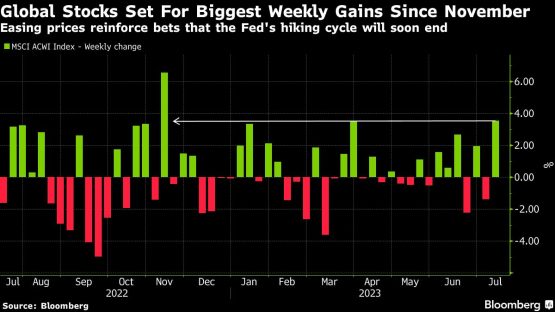Global stocks headed for their best weekly gains since November on bets that the US monetary tightening cycle is nearing an end. The yen rallied for a seventh day.
Most stock indexes advanced in Asia, while European and US equity futures were little changed. The gains in Asia helped extend the MSCI ACWI Index’s weekly rally to above 3%. Optimism about stronger efforts to bolster the Chinese economy also buoyed sentiment.
“We’re going to get more fiscal stimulus, more fiscal support from the government and I think that that could potentially ignite some animal spirits in China,” David Chao, global market strategist for Asia Pacific at Invesco Asset Management, said on Bloomberg Television. “A lot of the pessimism for Chinese equities appears to be overdone at these levels.”
Stocks fluctuated in Japan as the yen headed for a seven-day winning streak, which would mark its best performance since 2018.
“When you look at the selloffs of JGBs and the yen’s recent moves — or yen’s strength, it seems speculation about the BOJ’s policy tweak is encouraging investors to unwind their positions,” said Teppei Ino, the Tokyo head of global markets research at MUFG Bank.
The Bank of Japan will probably adjust its yield curve control program at its policy meeting this month as inflation is stronger than expected, said Hideo Hayakawa, a former executive director at the central bank, in an interview Thursday. “If they don’t, it doesn’t make sense.”
The dollar slipped for a sixth-straight session. That put an index of the currency’s strength on pace for the worst week since November. Treasuries were little changed in Asia.
The offshore yuan ticked higher. China has ample foreign exchange reserves and will “resolutely” prevent wild swings in the yuan exchange rate, People’s Bank of China Deputy Governor Liu Guoqiang said at a briefing Friday. The currency’s short-term movement cannot be predicted accurately, but it hasn’t deviated from its fundamentals, Liu added.
Easing inflation
Wall Street and markets globally got an extra dose of encouragement to bid up riskier assets after another US inflation report highlighted the view that price pressures are easing in the world’s largest economy. Tech megacaps led gains on Thursday, with the S&P 500 topping 4,500. Yields on policy-sensitive two-year Treasuries dropped 12 basis points to 4.63%.
The producer price index for final demand rose 0.1% in June from a year earlier, the smallest advance since 2020. The figures came just a day after data showed consumer prices increased at the slowest pace since 2021.
Disinflation has become a buzzword across trading desks, even though core inflation is still running above the central bank’s 2% target. Equities gained further traction on news that Fed Bank of St. Louis President James Bullard — who called for aggressive hikes — has resigned.
“The Fed has already won the battle against inflation,” Raffaele Bertoni, head of debt capital markets at Gulf Investment Corp., said on Bloomberg Television. “If they want to be serious in maintaining inflation under control, the focus should be more on the reduction of the balance sheet or the quantitative tightening rather than increasing rates further.”
Fed Bank of San Francisco President Mary Daly, however, told CNBC Thursday that it’s too soon for policymakers to say they have done enough to return US inflation to their target. Fed Governor Christopher Waller also said he expects the US central bank will need to raise rates twice more this year to bring inflation down to its target.
Traders are also awaiting the unofficial start of the second-quarter US earnings season Friday. Goldman Sachs Group Inc. strategists expect US companies to be able to meet the low bar set by consensus. Bloomberg Intelligence strategist Gina Martin Adams said “the S&P 500 earnings season will likely reveal more of the ‘less bad than feared’ trend that emerged in 1Q.”
In commodities, oil headed for a third weekly gain as supply disruptions in Africa and a reduction in shipments from Russia tightened the market. Gold was set for the best week since April.
Key events this week:
- US University of Michigan consumer sentiment, Friday
- US banks kick off earnings, Friday
Some of the main moves in markets:
Stocks
- S&P 500 futures were little changed as of 6:28 a.m. London time. The S&P 500 rose 0.85%
- Nasdaq 100 futures were little changed. The Nasdaq 100 rose 1.7%
- Euro Stoxx 50 futures fell 0.1%
- Japan’s Topix index was little changed
- Hong Kong’s Hang Seng Index rose 0.3%
- China’s Shanghai Composite Index rose 0.2%
- Australia’s S&P/ASX 200 Index rose 0.8%
Currencies
- The Bloomberg Dollar Spot Index fell 0.1%
- The euro was little changed at $1.1234
- The Japanese yen rose 0.3% to 137.69 per dollar
- The offshore yuan rose 0.2% to 7.1337 per dollar
- The Australian dollar was unchanged at $0.6889
- The British pound was little changed at $1.3127
Cryptocurrencies
- Bitcoin was little changed at $31 384.78
- Ether rose 1.1% to $2,007.49
Bonds
- The yield on 10-year Treasuries advanced one basis point to 3.78%
- Japan’s 10-year yield advanced one basis point to 0.475%
- Australia’s 10-year yield declined seven basis points to 3.98%
Commodities
- West Texas Intermediate crude was little changed
- Spot gold was little changed
© 2023 Bloomberg

